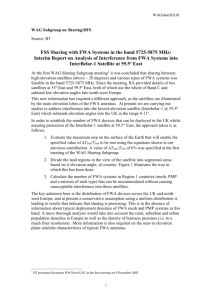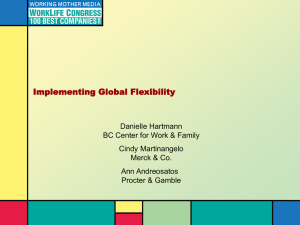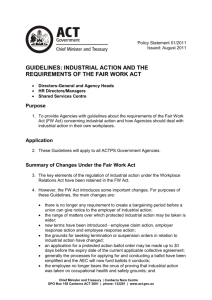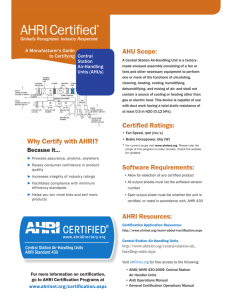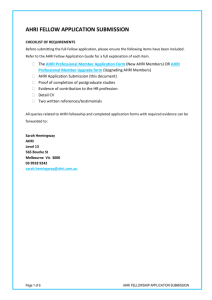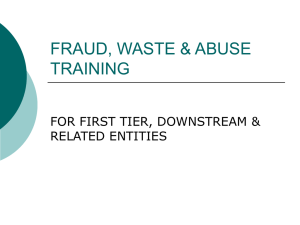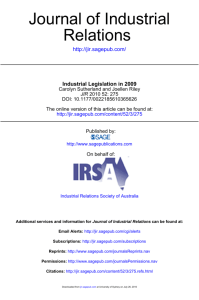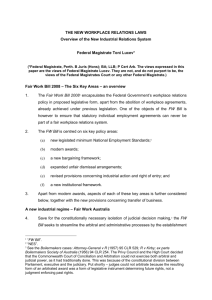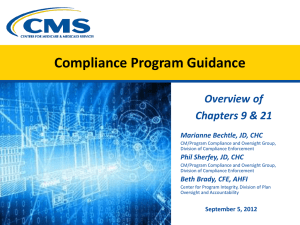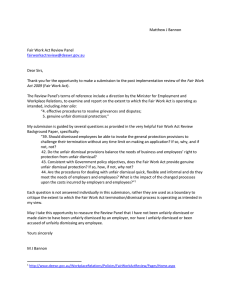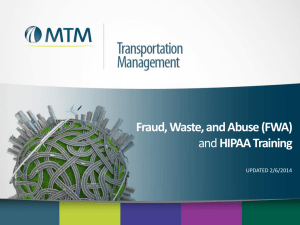Impact of Fair Work Act on Australian Workplaces: A Practitioner`s
advertisement
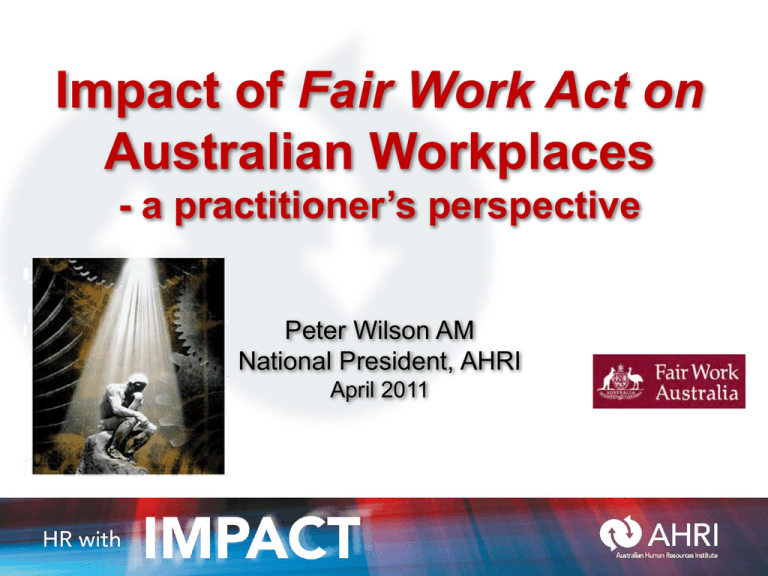
Impact of Fair Work Act on Australian Workplaces - a practitioner’s perspective Peter Wilson AM National President, AHRI April 2011 Background – the journey since 2007 … Work Choices Survey - Aug 07 • AHRI data 1000+ responses • Law changed follow up study deferred until 2010 Background to AHRI research • AHRI focus – high performing & equitable workplaces • AHRI WorkChoices Survey – Aug 07 (1000 replies) – Survey results very critical – “costly bureaucratic monster” – “Made the job harder & political criticism much easier” – “A backward step from 1996 Reith Workplace laws”. • Fair Work Act introduced July 2009 • Sept 2010 AHRI Fair Work Act survey (970 replies) • 2007 & 2010 Surveys not strictly comparable – changed laws Today’s economic environment • Post-GFC recovery • No double-dip • Intense Global Competition post 2009 • China / India / Aust: “up” • US, Europe: “sluggish” • $ appreciates - tougher competitive environment • Total factor productivity flat / declining TFP $A 2010 AHRI Survey: respondent profile - 54% from private sector companies - 17% from publicly listed companies - 15% from government - 5% MD/CEO - 32% executive-level HR - 38% middle-level & operational HR 2010 AHRI Survey questions covered - 1. Company & workforce profile 2. Fair Work Act & role as HR professional 3. Fair Work Act & organisation 4. Fair Work Act & employment contracts 5. Critical perspectives – from coal face of ‘implementation’ 2010 Key findings – job complexity 57% say FWA makes their job ‘more difficult’ 66% say FWA requires ‘more time’ on IR issues Key findings – formulating contracts 68% FWA requires more time making employment contracts 30% FWA will require more time making employment contracts in one year’s time - but … 47% say ‘no change’ by then … Key findings – bargaining Key findings – legal advice 74% say FWA increases need for legal advice 40% expect FWA will require increased legal advice in one year’s time - 41% expect ‘no change’ Key findings – workplace disputes 30% say managing workplace disputes is more difficult 54% say ‘no change’ 25% expect managing workplace disputes will still be more difficult in one year’s time 55% expect ‘no change’ Key findings – cost of IR 53% dealing with IR costs more - 35% say ‘no change’ 37% expect will cost more to deal with IR in a year’s time - 43% expect ‘no change’ Key findings – pay and penalty rates 31% say overall remuneration has increased 66% say ‘no change’ 25% say penalty rates for overtime have increased 71% say ‘no change’ Key findings – carers’ leave 20% say carers’ leave days allowed have increased 76% say ‘no change’ Most acknowledge change is because of competition for talent – not the FWA laws Key findings – union involvement 27% say union involvement in bargaining has increased 69% say ‘no change’ 26% union involvement in settling disputes has increased 69% say ‘no change’ Key findings – union visits & disputes 29% say union visits to work sites have increased 23% say industrial disputes have increased Key findings – productivity 13% say productivity has decreased 78% say ‘no change’ 58% say record keeping has increased 39% say ‘no change’ Key findings – jobs & productivity - 2013 Dual ‘sting in the tail’ results: 37% say FW Act will materially diminish business willingness to employ people 2011-13 53% say FW Act will cause negative impact on productivity growth 2011-13 Key findings – unfair dismissal 16% say new UD rules have increased the number of claims 72% say ‘no change’ 26% say new UD rules make redundancies harder 65% say ‘no change’ Note – AHRI survey of companies primarily above 100 employees – i.e. not SMEs Key findings – flexible arrangements 83% say coy has adopted ‘flexible working arrangements’ 14% say their organisation has not Most requested are: - working from home - flexible start & finish times - part-time work “Most acknowledged need to do this – due to war for talent” Key findings – transfer of business 41% say impact negative or very negative Sample respondent views: “increased the need for legal advice” “Staff transferring bring industrial instruments coy doesnt want” “Made sale difficult … buyer reluctant to take the staff on” “anti-employment provision” “Employees feel comfortable that they are not losing anything” Key findings – most significant FWA changes Sample respondent views: - “Additional training needed - business awareness of entitlements” - “Adverse action provisions” (expect these will be invoked more) - “Providing unions with ‘default’ bargaining status” - “Document everything so disputes can be settled based on actual fact” - “First line leaders must have employee relations capability” Key findings - expected effects of FWA Sample respondent views: • “bogged down in disputes with adversarial unions” • “Increased compliance costs” • “More open-minded about flexibility requests” • “Increased costs doing business; no increase prod’ty Updates - Current Senior Exec HR views Transfer of Business (Restructurings / Acquisitions): “businesses forced to acquire a mosaic of EBAs & employment rules and regulations” “doing little more than providing a decoration around increasing bureaucracy and declining productivity, with major anomalies to employment creation”. “Simple ‘no disadvantage test’ for critical minimum benefits should be all that’s required to protect workplace equity for employees transferred in restructurings” “Risk of another AMCOR case” Updates - Current Senior Executive HR views Bargaining & Agreement making • “As Prof Ron MacCallum recently noted – reaching useful end of common law to supervise bargaining outcomes”. • “Having inconsistent results emanate from the ‘luck of the draw’ on who you get from the FWA bench must end”. • “Must move to a system of minimum standards” • “FWA to convene as full bench to define decisions on majority basis, to eliminate current risk of rogue outcomes”. • “Give FWA discretion to approve agreements if fair and reasonable to do so, despite non-compliance with preapproval steps or procedural requirements - amend s 188” Updates - Current Senior Executive HR views • “JJR v TWU decision - effect of FWA Full Bench decision is protected action ballot can occur before bargaining is formally initiated”. • “The new FWA sees effective end of non-union agreements & individual contracts for non executives”. • “Right of Entry – this has become an open access freeway and many instances where it stopped production dead, for no genuine economic reason”. • Next AHRI FW Act Survey – late 2011 • AHRI - SHRM 2011 partnership – “Global Index of Workplace Performance & Flexibility” – 50 countries ranked overall by EIU • Beyond FWA & Workchoices … a “new way” for fairer & higher performing workplaces? AHRI 2011 “HR with Impact”
